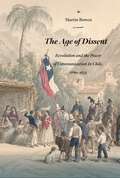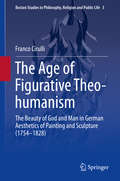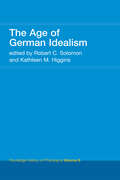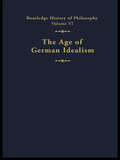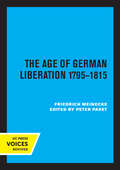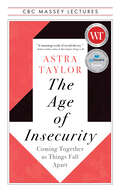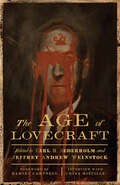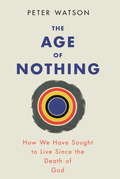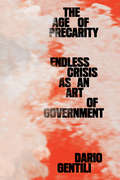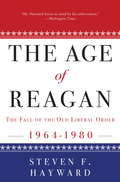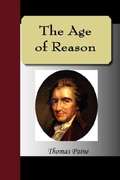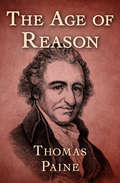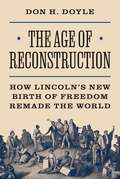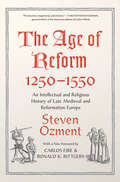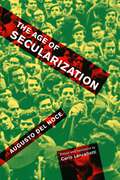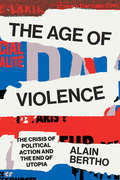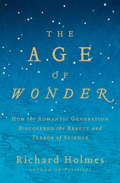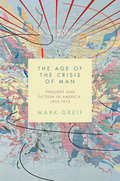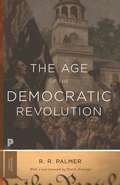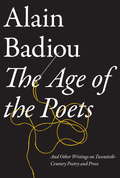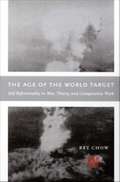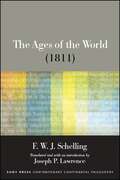- Table View
- List View
The Age of Dissent: Revolution and the Power of Communication in Chile, 1780–1833 (Diálogos Series)
by Martín BowenThe Age of Dissent argues that the defining feature of the Age of Revolutions in Latin America was the emergence of dissent as an inescapable component of political life. While contestation and seditious ideas had always been present in the region, never before had local regimes been forced to consider radical dissension as an unavoidable dimension of politics. Focusing on urban Chile between the first anticolonial conspiracy of 1780 and the consolidation of an authoritarian regime in 1833, the book argues that this revolution was caused by how people practiced communication and framed its power.
The Age of Figurative Theo-humanism
by Franco CirulliThis is a comprehensive, integrated account of eighteenth and early nineteenth century German figurative aesthetics. The author focuses on the theologically-minded discourse on the visual arts that unfolded in Germany, circa 1754-1828, to critique the assumption that German romanticism and idealism pursued a formalist worship of beauty and of unbridled artistic autonomy. This book foregrounds what the author terms an "Aesthetics of Figurative Theo humanism". It begins with the sculptural aesthetics of Johann Joachim Winckelmann and Gottfried Herder before moving on to Karl Philipp Moritz, Wilhelm Heinrich Wackenroder and Friedrich Schelling. The reader will discover how this aesthetic tradition, after an initial obsession with classical sculpture, chose painting as the medium more suited to the modern self's exploration of transcendence. This paradigm-shift is traced in the aesthetic discourse of Friedrich Schlegel and Georg Wilhelm Friedrich Hegel. In this work, the widespread prejudice that such aesthetics initiated a so-called "Modern Grand Narrative of the Arts" is deconstructed. One accusation directed at 18th century aesthetics has been that it realised into "Art" what had previously been a living, rich tissue of meaning: this work shows how Figurative Theo humanism's attention to aesthetic values was never detached from deeper theological and humanistic considerations. Furthermore, it argues that this aesthetic discourse never forgot that it emerged from modern disenchantment--far from occluding the dimension of secularization, it draws poignant meaning from it. Anyone with an interest in the current debates about the scope and nature of aesthetics(philosophers of art, theology, or religion) will find this book of great interest and assistance.
The Age of German Idealism: Routledge History of Philosophy Volume 6 (Routledge History Of Philosophy Ser.)
by Robert C. Solomon Kathleen M. HigginsGerman Idealism was one of the most fertile and important movements in the history of Western philosophy. This volume includes eleven chapters on all aspects and the period's most influential philosophers, including Kant and Hegel.
The Age of German Idealism: Routledge History of Philosophy Volume VI (Routledge History of Philosophy #Vol. 6)
by Robert C. Solomon Kathleen M. HigginsThe turn of the nineteenth century marked a rich and exciting explosion of philosophical energy and talent. The enormity of the revolution set off in philosophy by Immanuel Kant was comparable, by Kant's own estimation, with the Copernican Revolution that ended the Middle Ages. The movement he set in motion, the fast-moving and often cantankerous dialectic of `German Idealism', inspired some of the most creative philosophers in modern times: including G.W.F. Hegel and Arthur Schopenhauer as well as those who reacted against Kant - Marx and Kierkegaard, for example.This volume traces the emergence of German Idealism from Kant and his predecessors through the first half of the nineteenth century, ending with the irrationalism of Kierkegaard. It provides a broad, scholarly introduction to this period for students of philosophy and related disciplines, as well as some original interpretations of these authors. Each chapter is written by a distinguished scholar in the field. A glossary of technical terms together with a chronological table of philosophical, scientific and other important cultural events are provided.
The Age of German Liberation 1795-1815
by Friedrich MeineckeThis title is part of UC Press's Voices Revived program, which commemorates University of California Press’s mission to seek out and cultivate the brightest minds and give them voice, reach, and impact. Drawing on a backlist dating to 1893, Voices Revived makes high-quality, peer-reviewed scholarship accessible once again using print-on-demand technology. This title was originally published in 1977.
The Age of Insecurity: Coming Together as Things Fall Apart (The CBC Massey Lectures)
by Astra TaylorThese days, everyone feels insecure. We are financially stressed and emotionally overwhelmed. The status quo isn’t working for anyone, even those who appear to have it all. What is going on? In this urgent cultural diagnosis, author and activist Astra Taylor exposes how seemingly disparate crises—rising inequality and declining mental health, the ecological emergency, and the threat of authoritarianism—originate from a social order built on insecurity. From home ownership and education to the wellness industry and policing, many of the institutions and systems that promise to make us more secure actually undermine us. Mixing social critique, memoir, history, political analysis, and philosophy, this genre-bending book rethinks both insecurity and security from the ground up. By facing our existential insecurity and embracing our vulnerability, Taylor argues, we can begin to develop more caring, inclusive, and sustainable forms of security to help us better weather the challenges ahead. The Age of Insecurity will transform how you understand yourself and society—while illuminating a path toward meaningful change.
The Age of Lovecraft
by Carl H. Sederholm Jeffrey Andrew WeinstockCo-winner, Ray & Pat Browne Award for Best Edited Collection in Popular Culture and American Culture Howard Phillips Lovecraft, the American author of &“weird tales&” who died in 1937 impoverished and relatively unknown, has become a twenty-first-century star, cropping up in places both anticipated and unexpected. Authors, filmmakers, and shapers of popular culture like Stephen King, Neil Gaiman, and Guillermo del Toro acknowledge his influence; his fiction is key to the work of posthuman philosophers and cultural critics such as Graham Harman and Eugene Thacker; and Lovecraft&’s creations have achieved unprecedented cultural ubiquity, even showing up on the animated program South Park.The Age of Lovecraft is the first sustained analysis of Lovecraft in relation to twenty-first-century critical theory and culture, delving into troubling aspects of his thought and writings. With contributions from scholars including Gothic expert David Punter, historian W. Scott Poole, musicologist Isabella van Elferen, and philosopher of the posthuman Patricia MacCormack, this wide-ranging volume brings together thinkers from an array of disciplines to consider Lovecraft&’s contemporary cultural presence and its implications. Bookended by a preface from horror fiction luminary Ramsey Campbell and an extended interview with the central author of the New Weird, China Miéville, the collection addresses the question of &“why Lovecraft, why now?&” through a variety of approaches and angles. A must for scholars, students, and theoretically inclined readers interested in Lovecraft, popular culture, and intellectual trends, The Age of Lovecraft offers the most thorough examination of Lovecraft&’s place in contemporary philosophy and critical theory to date as it seeks to shed light on the larger phenomenon of the dominance of weird fiction in the twenty-first century.Contributors: Jessica George; Brian Johnson, Carleton U; James Kneale, U College London; Patricia MacCormack, Anglia Ruskin U, Cambridge; Jed Mayer, SUNY New Paltz; China Miéville, Warwick U; W. Scott Poole, College of Charleston; David Punter, U of Bristol; David Simmons, Northampton U; Isabella van Elferen, Kingston U London.
The Age of Nothing: How We Have Sought To Live Since The Death of God
by Peter WatsonThe closing months of 2008 saw the world's nations united in financial uncertainty. Amid endless reports of collapsing stock markets, failed banks, fiscal fraud and snowballing unemployment, THE AGE OF NOTHING offers a compelling insight into the demise of capitalism and the beginning of a new era.Peter Watson's scintillating thesis argues that the unprecedented credit crunch of 2008 was the result of a fundamental change in the fabric of society - one that became truly visible only as it reached its culmination.In a commanding narrative, Watson provides a historical perspective on the shift in our attitudes towards capitalism, while exploring the philosophical roots that underpin it. Of central importance in Watson's theory is Nietzsche's warning regarding mankind's responsibility for 'the death of God' - and the consequences thereof. Nietzsche's views on the frailty of human values in a world bereft of religious faith were echoed by writers including Tolstoy, Marx and Kandinsky - and his chilling message went on to resonate with thinkers throughout the 20th century. When Max Weber called the modern world 'disenchanted', and argued that society must choose to create a new value system based on knowledge or else surrender and embrace a religious faith, he was the latest in a long line of intellectuals attempting to address the problem Nietzsche had laid bare.With the arrival of THE AGE OF NOTHING, the line continues. The work fills a crucial gap in our intellectual history and serves as a comprehensive study of society's current predicament - as well as a timely answer to the question of what to do next.
The Age of Nothing: How We Have Sought To Live Since The Death of God
by Peter WatsonThe closing months of 2008 saw the world's nations united in financial uncertainty. Amid endless reports of collapsing stock markets, failed banks, fiscal fraud and snowballing unemployment, THE AGE OF NOTHING offers a compelling insight into the demise of capitalism and the beginning of a new era.Peter Watson's scintillating thesis argues that the unprecedented credit crunch of 2008 was the result of a fundamental change in the fabric of society - one that became truly visible only as it reached its culmination.In a commanding narrative, Watson provides a historical perspective on the shift in our attitudes towards capitalism, while exploring the philosophical roots that underpin it. Of central importance in Watson's theory is Nietzsche's warning regarding mankind's responsibility for 'the death of God' - and the consequences thereof. Nietzsche's views on the frailty of human values in a world bereft of religious faith were echoed by writers including Tolstoy, Marx and Kandinsky - and his chilling message went on to resonate with thinkers throughout the 20th century. When Max Weber called the modern world 'disenchanted', and argued that society must choose to create a new value system based on knowledge or else surrender and embrace a religious faith, he was the latest in a long line of intellectuals attempting to address the problem Nietzsche had laid bare.With the arrival of THE AGE OF NOTHING, the line continues. The work fills a crucial gap in our intellectual history and serves as a comprehensive study of society's current predicament - as well as a timely answer to the question of what to do next.
The Age of Precarity: Endless Crisis as an Art of Government
by Dario GentiliWhen Crisis Becomes the Norm: What Can We Do to Demand Change?Crisis dominates the present historical moment. The economy is in crisis, politics in both its past and present forms is in crisis and our own individual lives are in crisis, made vulnerable by the fluctuations of the labor market and by the undoing of social and political ties we inherited from modernity. Yet, traditional views of crises as just temporary setbacks do not seem to hold any longer; this crisis seems permanent, with no way out and no alternatives on the horizon.Reconstructing a political genealogy of the term from the Greek world to today's neoliberalism, this book demonstrates that crisis, understood as a "choice" between revolution and conservation, is a peculiarity of the modern era that does not apply to the present day. However, since its origin, the trope of crisis has proven to be one of the most effective instruments of social discipline and administration. The analytical trajectory followed by this book - which spans from Plato to Hayek, from the juridical and medical science of antiquity to the current technocracy, passing through the "weapons of criticism" of Marx and Gramsci - finally identifies, following Benjamin and Foucault, precariousness as the "form of life" that characterizes crisis understood as an art of government. But we still need to answer the question: "How can we recreate the possibility of political alternatives?"
The Age of Reagan: The Fall of the Old Liberal Order, 1964-1980
by Steven F. HaywardThe Age of Reagan brings to life the tumultuous decade and a half that preceded Ronald Reagan's ascent to the White House. Drawing on scores of interviews and years of research, Steven F. Hayward takes us on an engrossing journey through the most politically divisive years the United States has had to endure since the decade before the Civil War. Hayward captures an America at war with itself--and an era whose reverberations we feel to this very day. He brings new insight into the profound failure of Lyndon Johnson's Great Society, the oddly liberal nature of Richard Nixon's administration, the significance of Reagan's years as California's governor, the sudden-death drama of his near defeat of Gerald Ford in the 1976 Republican primary, the listlessness of Jimmy Carter's leadership, and the political earthquake that was Reagan's victorious presidential campaign in 1980. Provocative, authoritative, and majestic in scope, The Age of Reagan is an unforgettable account of the rebirth and triumph of the American spirit.
The Age of Reason: Being An Investigation Of True And Fabulous Theology - Primary Source Edition
by Thomas PaineThe author of Rights of Man and Common Sense argues for belief in God without religion.My own mind is my own church. In The Age of Reason, political activist and Founding Father Thomas Paine makes a powerful case for a rational approach to theology. In keeping with the intellectual tradition of British Deism, Paine rejects the notion of divine revelation, saying &“it is revelation to the first person only, and hearsay to every other.&” He proceeds with a detailed analysis of the Bible&’s inconsistencies and historical inaccuracies to conclude that it cannot be a divinely inspired text. Arguing against all forms of organized religion, he declares nature itself to be the only true testament to the existence of a divine creator. Originally published in three parts, in 1794, 1795, and 1807, The Age of Reason was a major influence on the freethinker movement in the United States. In Britain, however, it was declared seditious and led to the arrest of those who dared to print and distribute it. This ebook has been professionally proofread to ensure accuracy and readability on all devices.
The Age of Reconstruction: How Lincoln’s New Birth of Freedom Remade the World (America in the World #59)
by Don H. DoyleA sweeping history of how Union victory in the American Civil War inspired democratic reforms, revolutions, and emancipation movements in Europe and the AmericasThe Age of Reconstruction looks beyond post–Civil War America to tell the story of how Union victory and Lincoln’s assassination set off a dramatic international reaction that drove European empires out of the Americas, hastened the end of slavery in Latin America, and ignited a host of democratic reforms in Europe.In this international history of Reconstruction, Don Doyle chronicles the world events inspired by the Civil War. Between 1865 and 1870, France withdrew from Mexico, Russia sold Alaska to the United States, and Britain proclaimed the new state of Canada. British workers demanded more voting rights, Spain toppled Queen Isabella II and ended slavery in its Caribbean colonies, Cubans rose against Spanish rule, France overthrew Napoleon III, and the kingdom of Pope Pius IX fell before the Italian Risorgimento. Some European liberals, including Victor Hugo and Giuseppe Mazzini, even called for a “United States of Europe.” Yet for all its achievements and optimism, this “new birth of freedom” was short-lived. By the 1890s, Reconstruction had been undone in the United States and abroad and America had become an exclusionary democracy based on white supremacy—and a very different kind of model to the world.At home and abroad, America’s Reconstruction was, as W.E.B. Du Bois wrote, “the greatest and most important step toward world democracy of all men of all races ever taken in the modern world.” The Age of Reconstruction is a bracing history of a remarkable period when democracy, having survived the great test of the Civil War, was ascendant around the Atlantic world.
The Age of Reform, 1250-1550: An Intellectual and Religious History of Late Medieval and Reformation Europe
by Steven OzmentCelebrating the fortieth anniversary of this seminal book, this new edition includes an illuminating foreword by Carlos Eire and Ronald K. Rittges The seeds of the swift and sweeping religious movement that reshaped European thought in the 1500s were sown in the late Middle Ages. In this book, Steven Ozment traces the growth and dissemination of dissenting intellectual trends through three centuries to their explosive burgeoning in the Reformations—both Protestant and Catholic—of the sixteenth century. He elucidates with great clarity the complex philosophical and theological issues that inspired antagonistic schools, traditions, and movements from Aquinas to Calvin. This masterly synthesis of the intellectual and religious history of the period illuminates the impact of late medieval ideas on early modern society. With a new foreword by Carlos Eire and Ronald K. Rittgers, this modern classic is ripe for rediscovery by a new generation of students and scholars.
The Age of Responsibility: Luck, Choice, and the Welfare State
by Yascha MounkYascha Mounk shows why a focus on personal responsibility is wrong and counterproductive: it distracts us from the larger economic forces determining aggregate outcomes, ignores what we owe fellow citizens regardless of their choices, and blinds us to key values such as the desire to live in a society of equals. In this book he proposes a remedy.
The Age of Secularization (McGill-Queen's Studies in the History of Ideas #107)
by Augusto Del NoceA thought-provoking collection of essays and lectures by one of the most perceptive Italian cultural critics of the twentieth century.
The Age of Violence: The Crisis of Political Action and the End of Utopia
by Alain BerthoExploring the fury of the young in a world or crisis that seems to offer no alternatives"Only martyrs know neither pity nor fear. Believe me, the day when the martyrs are victorious will be the day of universal conflagration". Jacques Lacan made this gloomy prophesy back in 1959: but doesn't it also apply to our own time? Faced with a rise in attacks around the world, can we really just blame the 'radicalization of' Islam'? What hope is there for the alienated youth, as the wars that have ravaged the Middle East spill out across the globe?For Alain Bertho, the mounting chaos we see today is above all driven by the weakening of states' legitimacy under the pressure of globalization. Add to this the hypocrisy of the elites who beat the drum of 'security measures', even as they sow the seeds of violence around the world. This disorder is the swamp of despair which can only produce fresh atrocities.Today's youth are the lost children of neoliberal globalization, the inheritors of the political and human chaos it produces. When they find it easier to imagine the end of the world than the end of capitalism, their revolt tends to take the paths of martyrdom and despair. The closing of the revolutionary hypothesis allows only fury. The answer, Bertho argues, is a new radicalism, able to inspire a collective hope in the future.
The Age of Wonder: How the Romantic Generation Discovered the Beauty and Terror of Science
by Richard HolmesThe Age of Wonder is a colorful and utterly absorbing history of the men and women whose discoveries and inventions at the end of the eighteenth century gave birth to the Romantic Age of Science. When young Joseph Banks stepped onto a Tahitian beach in 1769, he hoped to discover Paradise. Inspired by the scientific ferment sweeping through Britain, the botanist had sailed with Captain Cook in search of new worlds. Other voyages of discovery—astronomical, chemical, poetical, philosophical—swiftly follow in Richard Holmes's thrilling evocation of the second scientific revolution. Through the lives of William Herschel and his sister Caroline, who forever changed the public conception of the solar system; of Humphry Davy, whose near-suicidal gas experiments revolutionized chemistry; and of the great Romantic writers, from Mary Shelley to Coleridge and Keats, who were inspired by the scientific breakthroughs of their day, Holmes brings to life the era in which we first realized both the awe-inspiring and the frightening possibilities of science—an era whose consequences are with us still.BONUS MATERIAL: This ebook edition includes an excerpt from Richard Holmes's Falling Upwards.
The Age of the Crisis of Man: Thought and Fiction in America, 1933–1973
by Mark GreifIn a midcentury American cultural episode forgotten today, intellectuals of all schools shared a belief that human nature was under threat. The immediate result was a glut of dense, abstract books on the "nature of man." But the dawning "age of the crisis of man," as Mark Greif calls it, was far more than a historical curiosity. In this ambitious intellectual and literary history, Greif recovers this lost line of thought to show how it influenced society, politics, and culture before, during, and long after World War II. During the 1930s and 1940s, fears of the barbarization of humanity energized New York intellectuals, Chicago protoconservatives, European Jewish émigrés, and native-born bohemians to seek "re-enlightenment," a new philosophical account of human nature and history. After the war this effort diffused, leading to a rebirth of modern human rights and a new power for the literary arts.Critics' predictions of a "death of the novel" challenged writers to invest bloodless questions of human nature with flesh and detail. Hemingway, Faulkner, and Richard Wright wrote flawed novels of abstract man. Succeeding them, Ralph Ellison, Saul Bellow, Flannery O'Connor, and Thomas Pynchon constituted a new guard who tested philosophical questions against social realities--race, religious faith, and the rise of technology--that kept difference and diversity alive.By the 1960s, the idea of "universal man" gave way to moral antihumanism, as new sensibilities and social movements transformed what had come before. Greif's reframing of a foundational debate takes us beyond old antagonisms into a new future, and gives a prehistory to the fractures of our own era.
The Age of the Democratic Revolution: A Political History of Europe and America, 1760-1800 - Updated Edition (Princeton Classics #7)
by R. R. PalmerFor the Western world, the period from 1760 to 1800 was the great revolutionary era in which the outlines of the modern democratic state came into being. Here for the first time in one volume is R. R. Palmer's magisterial account of this incendiary age. Palmer argues that the American, French, and Polish revolutions—and the movements for political change in Britain, Ireland, Holland, and elsewhere—were manifestations of similar political ideas, needs, and conflicts. Palmer traces the clash between an older form of society, marked by legalized social rank and hereditary or self-perpetuating elites, and a new form of society that placed a greater value on social mobility and legal equality.Featuring a new foreword by David Armitage, this Princeton Classics edition of The Age of the Democratic Revolution introduces a new generation of readers to this enduring work of political history.
The Age of the Poets
by Emily Apter Bruno Bosteels Alain BadiouThe Age of the Poets revisits the age-old problem of the relation between literature and philosophy, arguing against both Plato and Heidegger's famous arguments. Philosophy neither has to ban the poets from the republic nor abdicate its own powers to the sole benefit of poetry or art. Instead, it must declare the end of what Badiou names the "age of the poets," which stretches from Hölderlin to Celan. Drawing on ideas from his first publication on the subject, "The Autonomy of the Aesthetic Process," Badiou offers an illuminating set of readings of contemporary French prose writers, giving us fascinating insights into the theory of the novel while also accounting for the specific position of literature between science and ideology.From the Trade Paperback edition.
The Age of the World Target: Self-Referentiality in War, Theory, and Comparative Work
by Rey ChowMartin Heidegger once wrote that the world had, in the age of modern science, become a world picture. For Rey Chow, the world has, in the age of atomic bombs, become a world target, to be attacked once it is identified, or so global geopolitics, dominated by the United States since the end of the Second World War, seems repeatedly to confirm. How to articulate the problematics of knowledge production with this aggressive targeting of the world? Chow attempts such an articulation by probing the significance of the chronological proximity of area studies, poststructuralist theory, and comparative literature-fields of inquiry that have each exerted considerable influence but whose mutual implicatedness as postwar U. S. academic phenomena has seldom been theorized. Central to Chow’s discussions is a critique of the predicament of self-referentiality-the compulsive move to interiorize that, in her view, constitutes the collective frenzy of our age-in different contemporary epistemic registers, including the self-consciously avant-garde as well as the militaristic and culturally supremacist. Urging her readers to think beyond the inward-turning focus on EuroAmerica that tends to characterize even the most radical gestures of Western self-deconstruction, Chow envisions much broader intellectual premises for future transcultural work, with reading practices aimed at restoring words and things to their constitutive exteriority.
The Ages of the World (SUNY series in Contemporary Continental Philosophy)
by F. W. SchellingIn 1810, after establishing a reputation as Europe's most prolific philosopher, F. W. J. Schelling embarked on his most ambitious project, The Ages of the World. For over a decade he produced multiple drafts of the work before finally conceding its failure, a "failure" in which Heidegger, Jaspers, Voegelin, and many others have discerned a pivotal moment in the history of philosophy. Slavoj Žižek calls this text the "vanishing mediator," the project that, even while withheld and concealed from view, connects the epoch of classical metaphysics that stretches from Plato to Hegel with the post-metaphysical thinking that began with Marx and Kierkegaard. Although drafts of the second and third versions from 1813 and 1815 have long been available in English, this translation by Joseph P. Lawrence is the first of the initial 1811 text. In his introductory essay, Lawrence argues for the importance of this first version of the work as the one that reveals the full sweep of Schelling's intended project, and he explains its significance for concerns in modern science, history, and religion.
The Agon of Interpretations
by Ming XieWritten by a team of leading international scholars, The Agon of Interpretations explores the challenges and possibilities of critical intercultural hermeneutics in a globalized world. Editor Ming Xie and writers from eight countries on five continents not only lay out the importance of critical hermeneutics to intercultural understanding but also probe the conditions under which a hermeneutics that is both intercultural and critical can be possible. The contributors examine and define critical intercultural hermeneutics as an emerging field from a wide variety of disciplinary perspectives, including phenomenology, critical theory, sociology, object-oriented ontology, and pragmatism. The essays combine philosophical argumentation with historical and intellectual inquiry. Together, the contributors to The Agon of Interpretations demonstrate the value of critical intercultural hermeneutics for enabling intercultural communication, engagement, and understanding.
